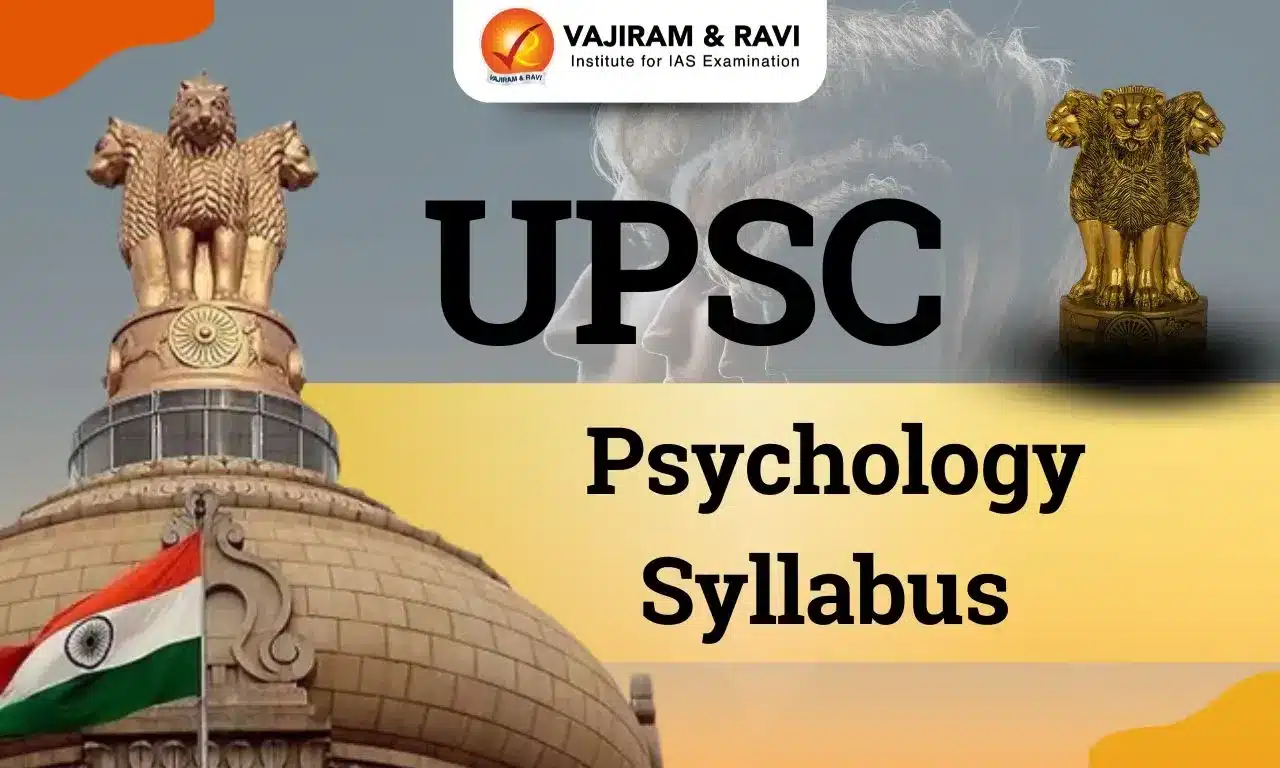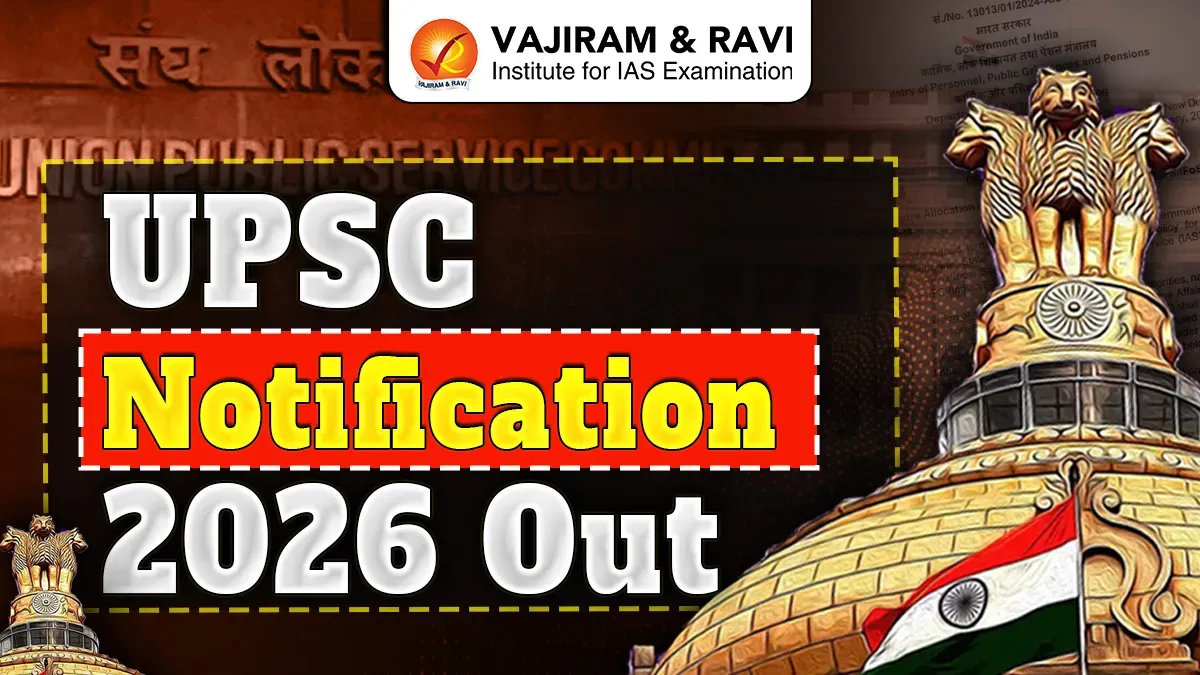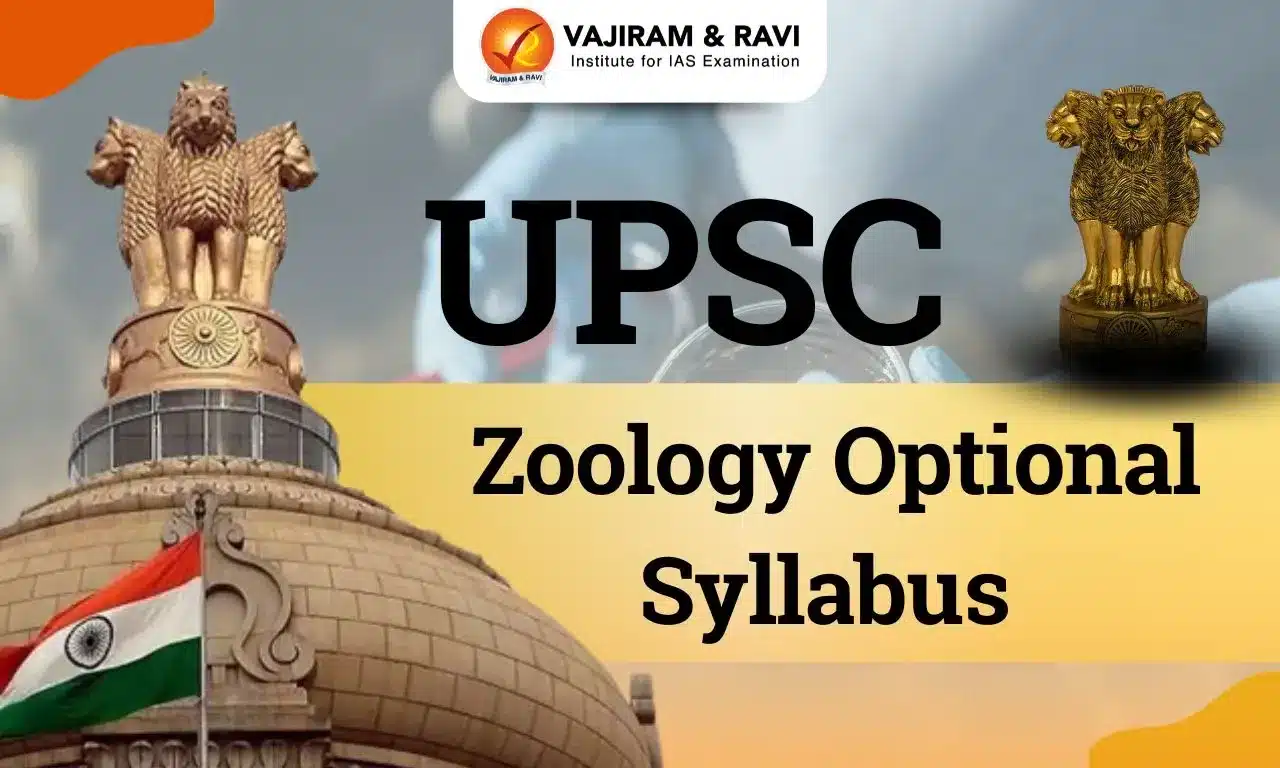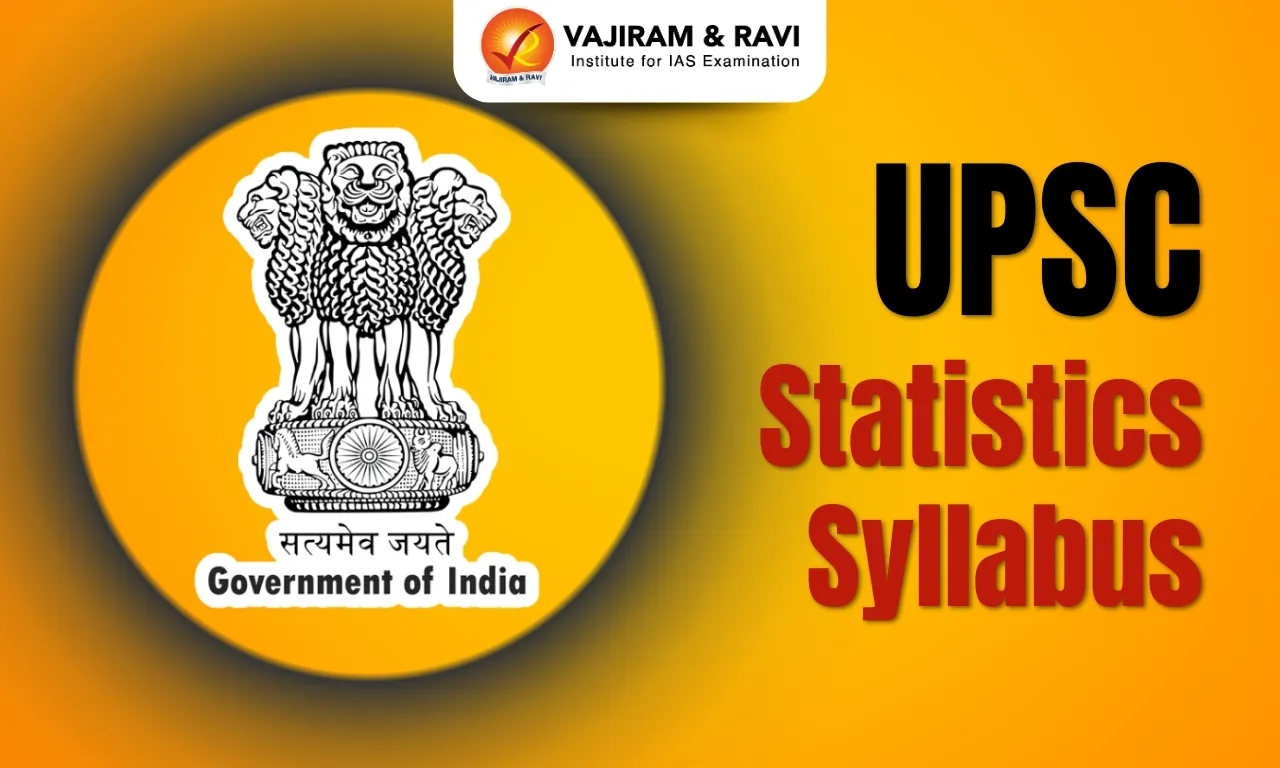The UPSC Psychology syllabus for Paper 1 consists of Foundations of Psychology, and Paper 2 consists of Psychology, its Issues, and Applications. The topics covered in the Psychology optional syllabus are mostly theoretical and applied psychology. The UPSC Psychology syllabus is comprehensive and requires candidates to have a deep understanding of psychological concepts and their practical applications in various contexts.
This article covers the UPSC Psychology optional syllabus for both Paper 1 and Paper 2, a few tips on how to prepare for this subject, and important topics of the subject.
UPSC Psychology Syllabus 2026
The UPSC Psychology syllabus is designed to assess candidates' understanding of human behaviour, mental processes, and the application of psychological principles to real-world situations. In the UPSC Mains exam, the optional paper's weightage is 500 marks, that is, 250 marks for each paper, so it is very important to give an ideal time for optional preparation to get a good rank in the Civil Services Exam. Psychology, as an optional subject in UPSC Mains, is a distinctive and well-structured subject as it places greater emphasis on conceptual understanding and is not limited to assembling memorisation of extensive amounts of knowledge.
UPSC Psychology Syllabus PDF
Here's the updated UPSC Psychology Syllabus PDF for UPSC CSE Exam 2026.
UPSC Psychology Syllabus 2026 for Paper 1
The UPSC Psychology Optional Syllabus for Paper 1 covers a broad spectrum of topics within psychology, spanning from the foundational principles to more advanced concepts. It explores various aspects of human behaviour, cognition, and emotion. Candidates are expected to demonstrate proficiency in areas such as psychological theories, research methods, human development, sensation and perception, learning and memory, intelligence, motivation, and personality.
UPSC Psychology optional syllabus for Paper 1 is mentioned below:
| Foundations of Psychology | |
| 1. Introduction | Definition of Psychology; Historical antecedents of Psychology and trends in the 21st century; Psychology and scientific methods; Psychology in relation to other social sciences and natural sciences; Application of Psychology to societal problems. |
| 2. Methods of Psychology | Types of research: Descriptive, evaluative, diagnostic and prognostic; Methods of Research: Survey, observation, case-study and experiments; Characteristics of experimental design and non-experimental designs; quasi-experimental designs; Focussed group discussions, brainstorming, grounded theory approach. |
| 3. Research methods | Major steps in psychological research (problem statement, hypothesis formulation, research design, sampling, tools of data collection, analysis and interpretation and report writing); Fundamental versus applied research; Methods of data collection (interview, observation, questionnaire and case study). Research Designs (Ex-post facto and experimental). Application of statistical techniques (t-test, two-way ANOVA, correlation and regression and factor analysis) item response theory. |
| 4. Development of Human Behaviour | Growth and development; Principles of development, Role of genetic and environmental factors in determining human behaviour; Influence of cultural factors in socialisation; Life span development—Characteristics, development tasks, promoting psychological well-being across major stages of the life span. |
| 5. Sensation, Attention and Perception | Sensation: concepts of threshold, absolute and difference thresholds, signal-detection and vigilance; Factors influencing attention including set and characteristics of stimulus; Definition and concept of perception, biological factors in perception; Perceptual organisation-influence of past experiences, perceptual defence-factor influencing space and depth perception, size estimation and perceptual readiness; The plasticity of perception; Extrasensory perception; Culture and perception, Subliminal perception. |
| 6. Learning | Concepts and theories of learning (Behaviourists, Gestaltalist and Information processing models). The processes of extinction, discrimination and generalisation. Programmed learning, probability learning, self-instructional learning, concepts, types and the schedules of reinforcement, escape, avoidance and punishment, modelling and social learning. |
| 7. Memory | Encoding and remembering; Short-term memory, Long-term memory, Sensory memory, Iconic memory, Echoic memory: The Multistore model, levels of processing; Organization and Mnemonic techniques to improve memory; Theories of forgetting: decay, interference and retrieval failure: Metamemory; Amnesia: Anterograde and retrograde. |
| 8. Thinking and Problem-Solving | Piaget’s theory of cognitive development; Concept formation processes; Information processing, Reasoning and problem-solving, Facilitating and hindering factors in problem-solving, Methods of problem-solving: Creative thinking and fostering creativity; Factors influencing decision-making and judgement; Recent trends. |
| 9. Motivation and Emotion | Psychological and physiological basis of motivation and emotion; Measurement of motivation and emotion; Effects of motivation and emotion on behaviour; Extrinsic and intrinsic motivation; Factors influencing intrinsic motivation; Emotional competence and the related issues. |
| 10. Intelligence and Aptitude | Concept of intelligence and aptitude, Nature and theories of intelligence-Spearman, Thurstone, Gulford Vernon, Sternberg and J.P. Das; Emotional Intelligence, Social intelligence, measurement of intelligence and aptitudes, concept of I Q deviation I Q, constancy of I Q; Measurement of multiple intelligence; Fluid intelligence and crystallized intelligence. |
| 11. Personality | Definition and concept of personality; Theories of personality (psychoanalytical, socio-cultural, interpersonal, developmental, humanistic, behaviouristic, trait and type approaches); Measurement of personality (projective tests, pencil-paper test); The Indian approach to personality; Training for personality development; Latest approaches like big 5-factor theory; The notion of self in different traditions. |
| 12. Attitudes, Values and Interests | Definitions of attitudes, values and interests; Components of attitudes; Formation and maintenance of attitudes. Measurement of attitudes, values and interests. Theories of attitude changes, strategies for fostering values. Formation of stereotypes and prejudices; Changing other’s behaviour, Theories of attribution; Recent trends. |
| 13.Language and Communication | Human language—Properties, structure and linguistic hierarchy, Language acquisition—predispotion, critical period hypothesis; Theories of Language development—Skinner and Chomsky; Process and types of communication—effective communication training. |
| 14. Psychology of Gender | Computer application in the psychological laboratory and psychological testing; Artificial intelligence; Psychocybernetics; Study of consciousnessleep-wak schedules; dreams, stimulus deprivation, meditation, hypnotic/drug induced states; Extrasensory perception; Intersensory perception; Simulation studies. |
Psychology Optional Syllabus for Paper 2
UPSC Psychology optional syllabus for Paper 2 is mentioned below:
| Psychology: Issues and Applications | |
| 1. Psychological Measurement of Individual Differences | The nature of individual differences. Characteristics and construction of standardised psychological tests. Types of psychological tests. Use, misuse and limitation of psychological tests. Ethical issues in the use of psychological tests. |
| 2. Psychological well-being and Mental Disorders | Concept of health-ill health positive health, well-being casual factors in Mental disorders (Anxiety disorders, mood disorders; schizophrenia and delusional disorders; personality disorders, substance abuse disorders). Factors influencing positive health, well-being, lifestyle and quality of life; Happiness disposition. |
| 3. Therapeutic Approaches | Psychodynamic therapies. Behaviour therapies. Client-centered therapy. Cognitive therapies. Indigenous therapies (Yoga, Meditation). Biofeedback therapy. Prevention and rehabilitation of the mentally ill; Fostering mental health. |
| 4. Work Psychology and Organisational Behaviour | Personnel selection and training. Use of Psychological tests in the industry. Training and human resource development. Theories of work motivation. Herzberg, Maslow, Adam Equity theory, Porter and Lawler, Vroom; Leadership and participatory management; Advertising and marketing; Stress and its management; Ergonomics; consumer psychology; Managerial effectiveness; Transformational leadership; Sensitivity training; Power and politics in organisations. |
| 5. Application of Psychology to Educational Field | Psychological principles underlying effective teaching-learning process. Learning styles. Gifted, retarded, learning disabled and their training. Training for improving memory and better academic achievement. Personality development and value education. Educational, vocational guidance and Career counselling. Use of Psychological tests in educational institutions; Effective strategies in guidance programmes. |
| 6. Community Psychology | Definition and concept of Community Psychology. Use of small groups in social action. Arousing Community consciousness and action for handling social problems. Group decision-making and leadership for social change. Effective strategies for social change. |
| 7. Rehabilitation Psychology | Primary, secondary and tertiary prevention programmes—role of psychologists. Organising services for the rehabilitation of physically, mentally and socially challenged persons including old persons. Rehabilitation of persons suffering from substance abuse, juvenile delinquency, and criminal behaviours. Rehabilitation of victims of violence. Rehabilitation of HIV/AIDS victims, the role of social agencies. |
| 8. Application of Psychology to disadvantaged groups | The concepts of disadvantaged, deprivation social, physical, cultural and economic consequences of disadvantaged and deprived groups. Educating and motivating the disadvantaged towards development; Relative and prolonged deprivation. |
| 9. Psychological problem of social integration | The concept of social integration. The problem of caste, class, religion and language conflicts and prejudice. Nature and manifestation of prejudice between the ingroup and outgroup. Casual factors of such conflicts and prejudices. Psychological strategies for handling conflicts and prejudices. Measures to achieve social integration. |
| 10. Application of Psychology in Information Technology and Mass Media | The present scenario of information technology and the mass media boom and the role of psychologists. Selection and training of Psychology professionals to work in the field of IT and mass media. Distance learning through IT and mass media. Entrepreneurship through e-commerce. Multilevel marketing. Impact of TV and fostering value through IT and mass media. Psychological consequences of recent developments in Information Technology. |
| 11. Psychology and Economic development | Achievement motivation and economic development. Characteristics of entrepreneurial behaviour. Motivating and Training people for entrepreneurship and economic development; Consumer rights and consumer awareness, Government policies for the promotion of entrepreneurship among youth including women entrepreneurs. |
| 12. Application of Psychology to environment and related fields | Environmental Psychology effects of noise, pollution and crowding. Population Psychology: Psychological consequence of population explosion and high population density. Motivating for small family norms. Impact of rapid scientific and technological growth on degradation of the environment. |
| 13. Application of psychology in other fields |
(a) Military Psychology Devising psychological tests for defence personnel for use in selection, Training, and counselling; training psychologists to work, with defence personnel in promoting positive health; Human engineering in defence. (b) Sports Psychology Psychological interventions in improving performance of athletes and sports. Persons participating in Individual and Team Games. (c) Media influences on pro and anti-social behaviour. (d) Psychology of Terrorism. |
| 14. Psychology of Gender | Issues of discrimination, Management of diversity; Glass ceiling effect, Self-fulfilling prophesy, Women and Indian society. |
UPSC Psychology Syllabus 2026 Preparation Strategy
Before beginning to prepare for the Psychology optional, read and understand the syllabus properly and analyze the previous year's questions to gain an understanding of how to prepare and demand for this optional subject. It helps in answer writing and identifying important topics from the UPSC Psychology syllabus, which are frequently asked in the exam.
- Before reading any standard book, refer to class 11th and 12th NCERT for a basic understanding of the subject. Then, refer to standard books and prepare notes from the same for quick revision and revise them multiple times.
- One must build a strong foundation in Paper I because this will serve as the foundation for answers in Paper II.
- Answer Writings tips: Properly analyse the last 10-15 years of UPSC previous year questions and the practice papers.
- Paper 1, which deals with Foundations of Psychology, has a more theoretical approach, so substantiate your answers with quotes from important researchers' research works.
- Paper 2 is more application-oriented, which deals with Psychology- its issues and applications, so one can write answers using the concepts studied in Paper 1 as both papers are interconnected.
Books to Prepare UPSC Psychology Optional Syllabus
To clear the exam, reading from the right sources is extremely important. The table below mentions all the books or study materials required to prepare for the Psychology optional syllabus.
| Booklist for Paper 1 | Booklist for Paper 2 |
|
- NCERTs 11th and 12th - Textbook of Psychology (Indian adaptation) by Robert Baron - Textbook of Psychology by Morgan and King - Social Psychology textbook by Baron and Branscombe - Research book by AK Singh |
- NCERTs 11th and 12th Textbook of Applied Psychology by Smarak Swain. |
Important Topics in UPSC Psychology Syllabus
Every topic from the UPSC Psychology syllabus is equally important in itself, so the entire syllabus must be thoroughly prepared. Here are some key topics from both Paper 1 and Paper 2.
- Paper 1: Research Methods, Motivation and Emotion, Attitudes, Values and Interests, Application of Psychology to environment and related fields.
- Paper 2: Work Psychology and Organisational Behaviour, Psychology of Gender, Psychological problem of social integration.
| Other Related UPSC Optional Syllabus | ||
|---|---|---|
|
UPSC Animal Husbandry & Veterinary Science Optional Syllabus |
|
|
Last updated on February, 2026
→ UPSC Notification 2026 is now out on the official website at upsconline.nic.in.
→ UPSC IFoS Notification 2026 is now out on the official website at upsconline.nic.in.
→ UPSC Calendar 2026 has been released.
→ Check out the latest UPSC Syllabus 2026 here.
→ Join Vajiram & Ravi’s Interview Guidance Programme for expert help to crack your final UPSC stage.
→ UPSC Mains Result 2025 is now out.
→ UPSC Prelims 2026 will be conducted on 24th May, 2026 & UPSC Mains 2026 will be conducted on 21st August 2026.
→ The UPSC Selection Process is of 3 stages-Prelims, Mains and Interview.
→ Prepare effectively with Vajiram & Ravi’s UPSC Prelims Test Series 2026 featuring full-length mock tests, detailed solutions, and performance analysis.
→ Enroll in Vajiram & Ravi’s UPSC Mains Test Series 2026 for structured answer writing practice, expert evaluation, and exam-oriented feedback.
→ Join Vajiram & Ravi’s Best UPSC Mentorship Program for personalized guidance, strategy planning, and one-to-one support from experienced mentors.
→ UPSC Result 2024 is released with latest UPSC Marksheet 2024. Check Now!
→ UPSC Toppers List 2024 is released now. Shakti Dubey is UPSC AIR 1 2024 Topper.
→ Also check Best UPSC Coaching in India
UPSC Psychology Syllabus FAQs
Q1. Is psychology in UPSC syllabus?+
Q2. How many students take psychology in UPSC?+
Q3. What is the role of psychology in UPSC?+
Q4. How can I cover psychology optional in UPSC?+
Q5. Who is the UPSC topper with psychology optional?+
















